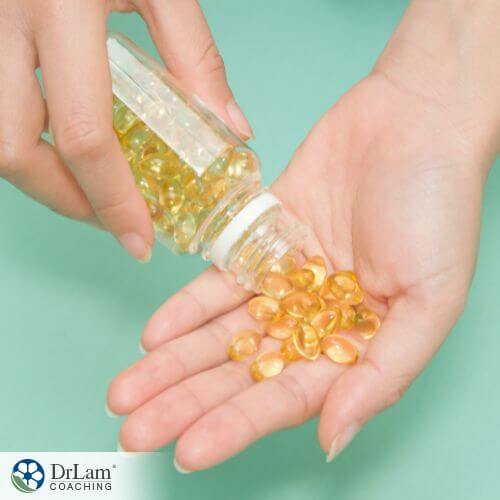 The different lipid peroxidation mechanisms and their subsequent detrimental effects on the body have been a topic of high interest in the past. More recently, studies have intensified in finding natural ways to inhibit lipid peroxidation. In these studies, a familiar vitamin has popped up – vitamin E. This article duly examines the relationship between vitamin E and lipid peroxidation, as well as the role of vitamin E and other vitamins in managing cholesterol levels.
The different lipid peroxidation mechanisms and their subsequent detrimental effects on the body have been a topic of high interest in the past. More recently, studies have intensified in finding natural ways to inhibit lipid peroxidation. In these studies, a familiar vitamin has popped up – vitamin E. This article duly examines the relationship between vitamin E and lipid peroxidation, as well as the role of vitamin E and other vitamins in managing cholesterol levels.
Lipid peroxidation is a process where oxidants, including free radicals, attack lipids, resulting in several byproducts. It is a chain reaction in which oxidants attack lipid molecules with carbon-to-carbon double bonds and oxidize them to the maximum extent. This reaction is complex, with the result being lipid hydroperoxides and aldehydes. While different oxidants can initiate lipid peroxidation, the most typical ones are reactive oxygen species and free oxygen radicals.1
The process of lipid peroxidation begins with hydrogen abstraction from carbon, and subsequent oxygen insertion to form peroxides. Although lipid peroxidation processes can apply to different types of lipids, polyunsaturated fatty acids (PUFA) are the most susceptible targets.2 The reason for this is that PUFAs are highly reactive compared to their saturated counterparts.
Considering that PUFAs make up biological cell membranes, lipid peroxidation poses a significant risk to the integrity of cells. According to researchers, lipid peroxidation is currently the main molecular mechanism that causes oxidative damage to cells.3 Aside from causing oxidative damage and stress, the end products of lipid peroxidation can also alter gene expression.
The end result of lipid peroxidation is irreversible damage to biological membranes. Usually, this results in apoptosis or ferroptosis, both mechanisms that lead to eventual cell death. Therefore after lipid peroxidation has occurred, it is impossible to restore the integrity of affected cells. However, since lipid peroxidation is a chain reaction, there are different stages at which to stop the reaction from proceeding to its endpoint.
As the initiators of lipid peroxidation are oxidants, antioxidants – which are substances that can attack and mop up these oxidants – are naturally suited to inhibiting lipid peroxidation. Of these antioxidants, vitamin E has developed a strong reputation as being an inhibitor of lipid peroxidation.
Studies show that the vitamin can scavenge lipid peroxyl radicals, terminating the lipid peroxidation chain reaction.4 Although there are eight forms of vitamin E, the form most associated with inhibiting lipid peroxidation is alpha-tocopherol. Further research also confirms that a deficiency of alpha-tocopherol is linked with an increase in peroxidation products.5
However, it is essential to note that the antioxidant effects of vitamin E are strongly related to the type of oxidants involved. While vitamin E is efficient in scavenging lipid peroxyl radicals, it is not as efficient in mopping up other radicals involved in lipid peroxidation initiation.4 Therefore, it is essential for medical practitioners trying to limit lipid peroxidation with vitamin E to consider other antioxidants, particularly vitamin C and glutathione. This ensures a complementary effect in preventing oxidative stress and damage.
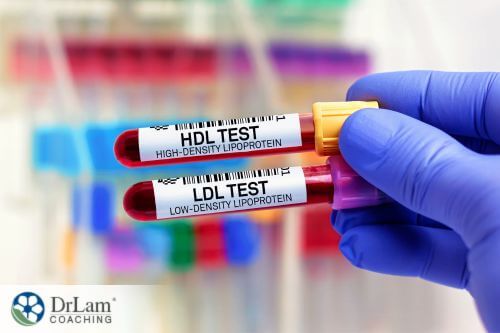 According to the CDC, over 102 million Americans have high cholesterol levels, with 35 million of those having dangerously high cholesterol levels. Cholesterol levels are one of the most frequently mentioned topics in medical discourse, yet not many fully understand what this signifies or the appropriate levels.
According to the CDC, over 102 million Americans have high cholesterol levels, with 35 million of those having dangerously high cholesterol levels. Cholesterol levels are one of the most frequently mentioned topics in medical discourse, yet not many fully understand what this signifies or the appropriate levels.
Cholesterol is a waxy substance in blood lipids. While the body needs cholesterol to build cells, having too much cholesterol can cause fatty deposits that block blood vessels. If these deposits remain in the blood vessels for extended periods, they may solidify and form plaques that inhibit blood flow. This condition is known as atherosclerosis and can cause serious health conditions. Aside from the high risk of heart attack with high cholesterol levels, there may be a deficiency in the amount of oxygen reaching the brain, resulting in stroke.
However, all cholesterol types are not the same. Here are some general guidelines on where you would want your cholesterol levels. Keeping in mind this is just basic bloodwork and if you want to dive further into cholesterol, ask your provider for an advanced lipid profile which will include cardiovascular markers of plaque, particle size and pattern, and apolipoproteins.
The dangers of high cholesterol are well-documented, being linked to various serious cardiovascular conditions, like heart attack and stroke. Aside from these common conditions, high cholesterol levels may also increase the stress on the heart and blood vessels. If this high stress persists, the Cardionomic circuit of the body may become dysregulated. This circuit is one of the six circuits of the NeuroEndoMetabolic (NEM) Stress Response, the body’s in-built stress-managment system.
With continual dysregulation of the Cardionomic circuit of the NEM, Adrenal Fatigue Syndrome (AFS) may result. Adrenal fatigue is a non-Addison's type of adrenal dysfunction, in which the body’s stress response cannot keep up with life’s chronic stressors. It is, therefore, imperative to keep cholesterol levels within the healthy range.
The search for cholesterol reducers has led researchers to vitamin E. According to studies, vitamin E tocotrienol supplementation can significantly reduce LDL and total cholesterol levels.6 Further studies in the American Journal of Clinical Nutrition also link high cholesterol and triglycerides levels to poor vitamin E function.7
The mechanism of action of vitamin E for lowering cholesterol is the retardation of plaque buildup in the blood vessels. However, vitamin E cannot be a standalone management option to lower cholesterol, as there are concerns over the amount of vitamin E that reaches the tissues where they are needed in cases of high cholesterol levels.
In modern medicine, statins are the go-to for many health practitioners to lower cholesterol levels. However, a combination of statins with supplements can give optimal results. Here are six of the best supplements for lowering cholesterol.
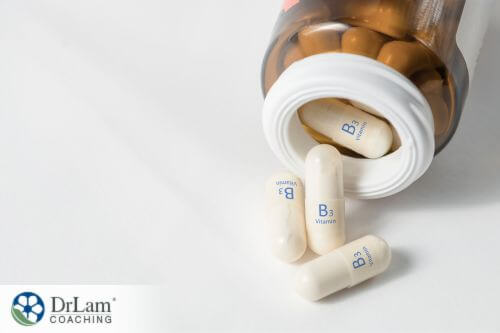 When reducing cholesterol levels with vitamins, there is no single vitamin that can adequately reduce cholesterol levels to normal standards. Instead, a combination of different vitamins will do the trick. Nonetheless, vitamin B3 (niacin) is widely recognized as the best vitamin for reducing LDL and increasing HDL cholesterol levels. The recommended daily intake of vitamin B3 is between 14 and 16 milligrams.
When reducing cholesterol levels with vitamins, there is no single vitamin that can adequately reduce cholesterol levels to normal standards. Instead, a combination of different vitamins will do the trick. Nonetheless, vitamin B3 (niacin) is widely recognized as the best vitamin for reducing LDL and increasing HDL cholesterol levels. The recommended daily intake of vitamin B3 is between 14 and 16 milligrams.
This supplement’s main ingredient is vitamin E, mainly alpha-tocopherol, although it also contains natural mixed tocopherols. The roles of vitamin E in lowering LDL cholesterol levels and triglycerides are well documented. There is also the added benefit that this supplement prevents the oxidation of both cholesterol and triglycerides and inhibits lipid peroxidation. This protects the body from oxidative stress and also helps maintain good cardiovascular health.
These are plant sterols that prevent the intestines from absorbing cholesterol into the blood. Phytosterols can decrease LDL levels in the blood. While there are supplement pills of phytosterols, you can also get them naturally from fruits, whole grains, nuts, seeds, and unrefined vegetable oils.
Soluble fibers, like psyllium, can assist in the elimination of cholesterol from the body by increasing bowel movement. A daily supplementation of 10 grams of psyllium can reduce total and LDL cholesterol levels. Also, since psyllium is a laxative, it can be useful for people managing gut problems.
Omega-3s can reduce high triglyceride levels and increase HDL cholesterol levels. Also, omega-3 fatty acids can reduce the risk of cardiovascular conditions by altering the size of cholesterol particles.8 You can get omega-3 fatty acids from fish oil supplements or by simply eating oily fish.
This supplement is the product of fermenting white rice kernels with Monascaceae yeast strains. Red yeast rice has several health benefits, but none more pronounced than its cholesterol-lowering effects. This is due to the presence of monacolin K, which competitively inhibits the biosynthesis of cholesterol. You will want to take CoQ10 while taking red yeast rice to replenish mitochondrial energy. Dr. Lam's RQ Plus contains both Red yeast rice and CoQ10 to help support healthy cholesterol and mitochondrial levels.
Berberine has a great effect on balancing cholesterol, but also promoting better metabolic and sugar control. Those who have issues with both insulin resistance and high cholesterol should consider Dr. Lam's Berbeblast to improve cardiovascular health.
Aside from supplement and medication use, there are lifestyle changes that can also help lower cholesterol, including:
Vitamin E has several health benefits, and they include:
Vitamin E is readily found in many foods. These include:
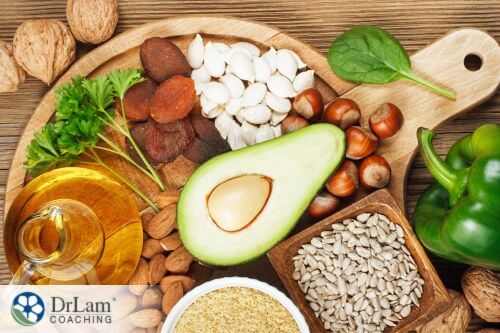 Plant-based oils, like olive, soybean, and sunflower oils
Plant-based oils, like olive, soybean, and sunflower oilsThe recommended daily amount of vitamin E is 15 mg. Although a vitamin E deficiency is possible, experts note that it is extremely rare, as most people get enough of it from their regular diet.
Despite the benefits the vitamin brings for maintaining heart health and lowering cholesterol, consuming more than 1000 mg or 1465 IU of vitamin E supplements daily is possibly unsafe. Possible side effects include excess bleeding, headache, nausea, and lethargy.
It is always best to talk to your doctor before starting any new supplements, particularly if you take medication or have any preexisting health conditions.
Lipid peroxidation is a complex chain reaction initiated by oxidants, causing irreversible cell membrane damage and gene modifications. One of the emerging management options for lipid peroxidation is vitamin E, which can mop up free radicals and terminate the peroxidation chain reaction. However, vitamin E should be combined with other vitamins like Liponano C and Liponano Glutathione for optimal antioxidant effects. Vitamin E also plays a key role in lowering cholesterol and related risk for cardiovascular conditions. However, ensure you get in touch with your healthcare provider before commencing the use of vitamin E for lipid peroxidation or cholesterol lowering.
For more information about lipid peroxidation, the team at Dr. Lam Coaching can help. We offer a free, no-obligation phone consultation at +1 (626) 571-1234 where we will privately discuss your symptoms and various options. You can also send us a question through our Ask The Doctor system by clicking here.
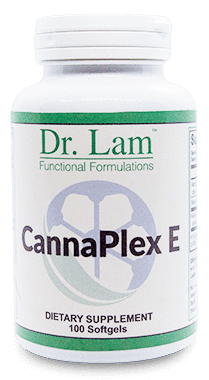
Discover the goodness of vitamin E in maintaining cardiovascular health
Ayala, A., Muñoz, M.F., Argüelles, S. "Lipid Peroxidation: Production, Metabolism, and Signaling Mechanisms of Malondialdehyde and 4-Hydroxy-2-Nonenal." Oxidative Medicine and Cellular Longevity, vol. 2014, Article ID 360438, https://doi.org/10.1155/2014/360438.
Cai, Zhengwei. "Lipid Peroxidation." Encyclopedia of Toxicology (Second Edition), 2005.
Repetto, M., Semprine, J., & Boveris, A. "Lipid Peroxidation: Chemical Mechanism, Biological Implications and Analytical Determination." InTech, 2012, https://doi.org/10.5772/45943.
Niki, Etsuo. "Lipid Oxidation That Is, and Is Not, Inhibited by Vitamin E: Consideration about Physiological Functions of Vitamin E." Free Radical Biology and Medicine, vol. 176, 2021, pp. 1-15, https://doi.org/10.1016/j.freeradbiomed.2021.09.001.
Barros, S., et al. "Aging and Oxidative Stress." Molecular Aspects of Medicine, 2004, pp. 98-2997.
Yuen, Kah Hay, et al. "Effect of Mixed-Tocotrienols in Hypercholesterolemic Subjects." Functional Foods in Health and Disease, vol. 3, 2011, pp. 106-117.
Traber, M.G., et al. "α-Tocopherol Disappearance Rates from Plasma Depend on Lipid Concentrations: Studies Using Deuterium-Labeled Collard Greens in Younger and Older Adults." The American Journal of Clinical Nutrition, vol. 101, no. 4, 2015, pp. 752-759, https://doi.org/10.3945/ajcn.114.100966.
Cartolano, F.C., et al. "Omega-3 Fatty Acids Improve Functionality of High-Density Lipoprotein in Individuals With High Cardiovascular Risk: A Randomized, Parallel, Controlled and Double-Blind Clinical Trial." Frontiers in Nutrition, vol. 8, 2022, Article 767535.
While vitamin E is an efficient scavenger of lipid peroxyl radicals, it is not as efficient against other oxidants that may cause lipid peroxidation. Therefore, it is important to complement vitamin E with other antioxidants like vitamin C to thoroughly inhibit lipid peroxidation.